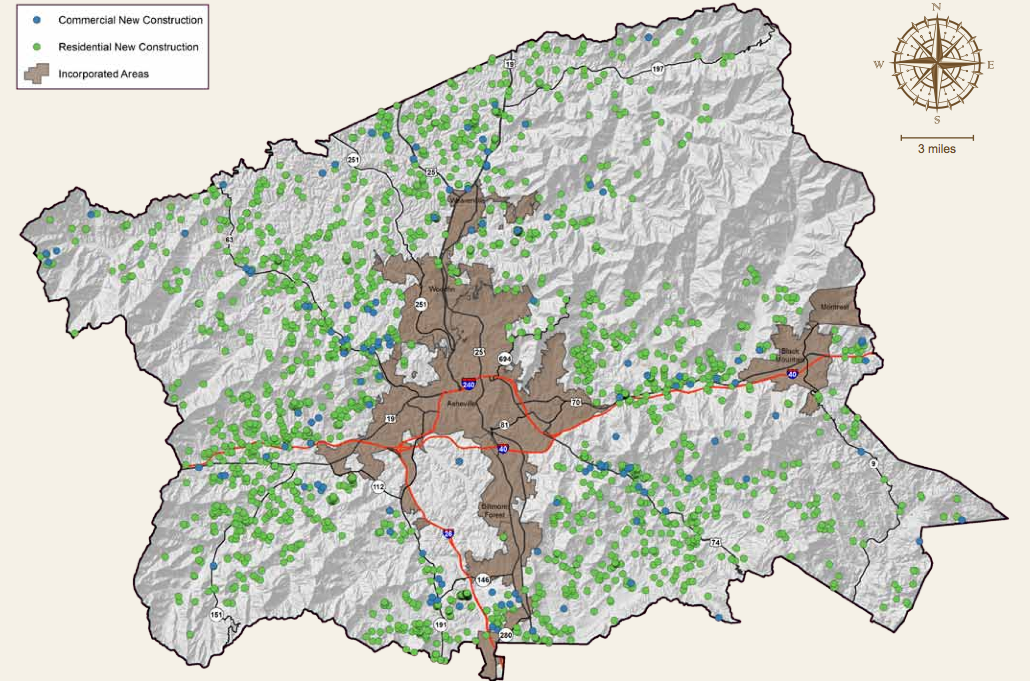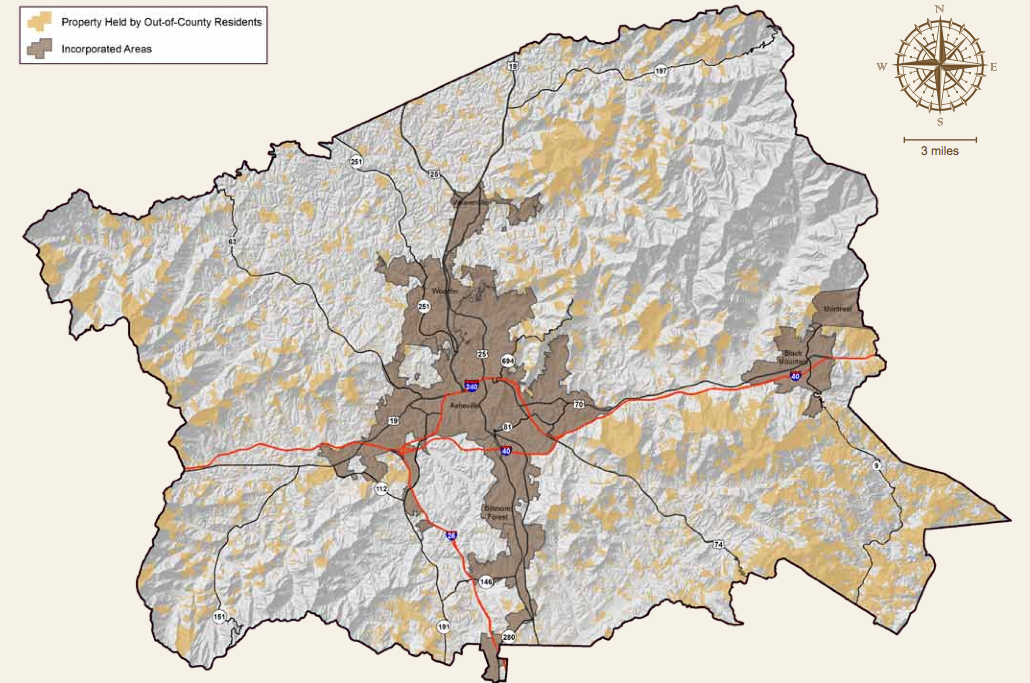This map from the new land use plan shows that about 25 percent of private land in unincorporated parts of Buncombe County is owned by people who don’t live in Buncombe County.
Buncombe County Commissioners sought to find a better balance between environmental protection and private property rights Sept. 17, unanimously approving an update to their land use plan.
The document is intended to “provide a basis for future planning efforts” and “create a baseline for land use in the county,” explained county planner Debbie Truempy.
The county first developed a comprehensive land use plan in 1998. Noting that he is the only remaining commissioner who served at that time, Board Chair David Gantt remembered that the original draft generated “a pretty heated discussion.”
However, the updated draft elicited nothing but praise from him and his current colleagues. No local residents mentioned it during a public comment period. Still, Gantt noted that zoning and land use issues are often contentious.
“We have a moral obligation to take care of our environment, while we balance the rights of people to develop their private property,” Gantt maintained. “And it’s always a tough, tough, balance to make that work right. And every community has a different value.”
Commissioner Joe Belcher praised staff for adding language to the plan that emphasis regulatory flexibility, particularly when it comes to affordable housing developments.
“I think it’s a good plan with a lot of built-in flexibility,” noted Belcher, who recently retired after working for decades in the manufactured home industry. “There was a lot of mention of affordable housing. … I appreciate that.”
Although the plan includes a number of other specific recommendations (see a list of highlights below), commissioners will need to take further action to make them law.
Meanwhile, Commissioner Ellen Frost noted that many of the land use recommendations “seem to work hand and glove with our sustainability plan.” She asked staff to add language to the land use document specifically linking it to the sustainability plan, which “is intended to inspire our community to put sustainable practices first, thereby strengthening our environment, community, and economy,” according to the Buncombe County website. Commissioners unanimously approved that document in May of 2012.
In addition, Vice Chair Holly Jones emphasized that such plans need to be regularly evaluated and improved, taking into account demographic changes.
“We are a growing community, and these are documents we need to come back to,” she noted. “As we find things that are working, or not working, lets come back to them. … None of us have a crystal ball.”
Recommendations in the land use plan approved by commissioners Sept. 17 include:
• Allowing more flexibility in determining the appropriate height of new buildings.
• Adjusting policies to be in better alignment with requirements of the Americans with Disabilities Act.
• Allowing more flexibility when it comes to setbacks in new residential development.
• Better differentiating rules between single manufactured homes and mobile home parks.
• Clarifying the requirements for co-housing and intentional community models to allow for more flexibility.
* Developing a Resort/Conference Center Zoning District in order to accommodate large-scale resort, retreat or conference facilities.
• Creating an Airport Industrial District which accounts for the land use needs of the Asheville Regional Airport.
• Developing a Conservation District to apply to parklands (and possibly to privately held properties under permanent conservation easements).
• Allowing for collocation of wireless telecommunication antennas at existing sites with the goal of minimizing the construction of new communications towers.

This map from the land use plan shows the distribution of new residential and commercial building permits in unincorporated areas of Buncombe County.




Before you comment
The comments section is here to provide a platform for civil dialogue on the issues we face together as a local community. Xpress is committed to offering this platform for all voices, but when the tone of the discussion gets nasty or strays off topic, we believe many people choose not to participate. Xpress editors are determined to moderate comments to ensure a constructive interchange is maintained. All comments judged not to be in keeping with the spirit of civil discourse will be removed and repeat violators will be banned. See here for our terms of service. Thank you for being part of this effort to promote respectful discussion.